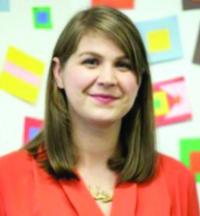April 26, 2018

Not since the civil rights movement has the nation seen such a widespread rise in student activism. So Sydney Chaffee, the 2017 National Teacher of the Year who teaches ninth-grade humanities at Codman Academy Charter Public School in Dorchester, was not surprised to learn about a second grader in her school who wants to change the world. She was, however, stunned to learn that this student was afraid to use his voice for fear of getting shot. The conversation inspired her to write the essay below.
“I talk a lot about how our students can change the world. And I mean it. Glance at the headlines any time in the last month, and I guarantee you’ll see examples of young activists spurring change. Our kids have the power to make the world a better and more just place.
But what happens when they are afraid to use that power?
“Last week, I watched a video clip of an interview one of my colleagues conducted with an African-American boy in the second grade. “What do you want to fix in the world?” she asked him. Without skipping a beat, the boy replied, “racism.” He went on to explain that his favorite subject in school is writing, because he likes to write biographies of people like Dr. Martin Luther King Jr.
“Are there things you would want to change in the world like Martin Luther King did?” the interviewer asked. The boy’s face changed. “No,” he said, shaking his head.
“No?” she asked. “What are some things that you don’t like?” He shrugged. In a small voice, he said, tentatively, “Guns. Racism.” He continued, “I can’t say I’m gonna change it.”
“Why not? she asked. “Then I’ll just get shot like Martin Luther King,” he said.
“This clip destroyed me. I watched it over and over, this little boy’s body language completely morphing at the thought of what might happen to him if he tried to change the world. He retreated into himself, lost his certainty. It was heartbreaking.
“But he’s right, of course. Our kids don’t miss anything. I can’t wear the same outfit twice in one week without them commenting, so it certainly won’t escape their notice that being an activist remains a dangerous choice.
“For every breathless news story or blog post about the Parkland student activists, for example, there are countless online trolls ready to attack Emma Gonzalez for wearing a Cuban flag on her jacket or, unbelievably, call for her to be shot. The activist Deray Mckesson received death threats and was sued by police for “inciting violence” by being a leader within the Black Lives Matter movement. Malala Yousafzai was shot in the head after advocating for girls’ right to education.
“The question is, how do we, as teachers, help our students reckon with a world that is this threatened by their voices?
“I want that second grade boy to know that he’s right: There are things in the world that need changing, and doing the hard work to change them means taking scary risks. I want him to know that he gets to decide whether and how he wants to engage, and that his teachers will be there no matter what. I also want him to know that his teachers stand with him.
“When teacher activism feels too scary, we’ve got to remember that boy, and all of our other students who are afraid to stand out. We have to teach them the histories of movements for social change so they have multiple examples of what activism can look like. We have to help them understand current events so they can decide which issues are important to them. We have to teach them to read critically, write persuasively, and speak powerfully. We have to use whatever privilege we have to open doors for them or amplify their messages. We have to model what it looks like to be brave.
“I firmly believe that teaching is inherently a political act. Every choice we make in the classroom communicates our values. As author Rebecca Solnit writes in her book “Hope in the Dark”: “We are all activists in some way or another, because our actions (and inactions) have impact.”
As a teacher, this rings especially true to me. Whether we choose to talk with our students about changing the world or not, we’re teaching them lessons about what matters. And with so much activism coming from our kids right now, the choices we make about how to engage speak volumes.



